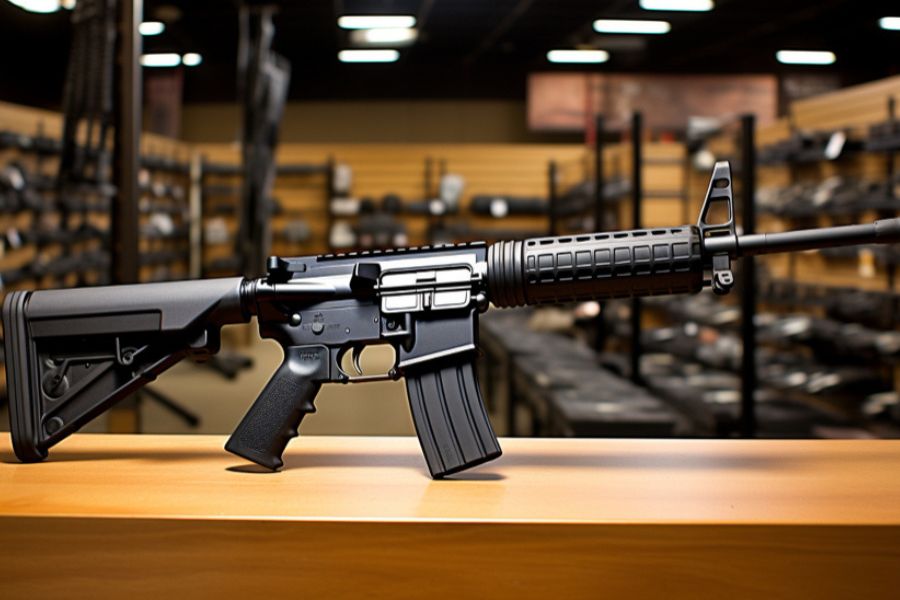Starting an FFL store involves navigating a complex application process with the Bureau of Alcohol, Tobacco, Firearms, and Explosives (ATF). This step-by-step guide will walk you through the essential stages of obtaining your Federal Firearms License, from gathering the necessary documents to ensuring compliance with regulations. Whether you’re a new entrepreneur or looking to expand your business, this guide will provide valuable insights into launching your FFL store successfully.
Highlights
- Operating as an FFL store is essential for legally engaging in the firearms industry, ensuring compliance with federal, state, and local regulations while fostering trust and credibility with customers.
- Securing an FFL involves: choosing the right business structure, preparing necessary documentation, passing background checks, and staying compliant with ongoing ATF regulations.
Navigating the ATF Application for Your FFL Store
The firearms industry is seeing growing demand, and for those planning to open a gun shop, it’s essential to be familiar with the key steps and requirements for an FFL store.
The bar below graph illustrates the volume of applications recorded in the National Firearms Registration and Transfer Record (NFRTR) and processed by the National Firearms Act (NFA) Division from FY 2005 to FY 2023. Notably, in FY 2023, the NFA Division processed a total of 1,069,787 forms.

The application process with the Bureau of Alcohol, Tobacco, Firearms, and Explosives (ATF) can be complex, requiring careful preparation and adherence to federal regulations. This guide will help you navigate the ATF application process, ensuring that you understand the key requirements and basic steps to successfully secure your Federal Firearms License.
Key Documents and Information Needed
Before you even begin filling out the ATF Form 7 (the application for an FFL), it’s vital to gather all the required documents and information. Missing or incomplete information can lead to delays or even denial of your application.
- Personal Identification
Provide government-issued ID, like a driver’s license or passport, and proof of U.S. citizenship or legal residency. This confirms your eligibility to operate an FFL store.
- Business Location Details
Your business premises must comply with local zoning laws. Provide documentation proving that your location is approved for firearm sales. This may require a letter or permit from your local zoning authority or a business license specifying your premises for firearm-related activities.
- Business Structure Documentation
Sole proprietors may need only a business license. Corporations or partnerships require detailed documents, such as articles of incorporation or partnership agreements, clearly outlining ownership and management.
- State and Local Permits
Besides federal licensing, you may need specific state or local permits to sell firearms legally. Research and obtain all necessary permits, including state firearms dealer licenses, sales tax permits, and other relevant local permits.
- Description of Business Activities
Provide a detailed description of your FFL store’s activities. Include the types of firearms you plan to sell, any gunsmithing services, and whether you’ll deal in NFA items like suppressors or short-barreled rifles.
- Record-Keeping Plans
Demonstrate how you’ll maintain ATF compliance, particularly in record-keeping. Outline how you plan to track all firearm transactions, including acquisition and disposition records, using either a Bound Book or a compliant digital system.
Background Checks, Business Structure Requirements, and Fees
The ATF application involves several critical steps that you need to be well-prepared for:
- Background Checks
All responsible persons (owners, partners, board members) must undergo rigorous background checks, including fingerprinting, to ensure no disqualifying factors, such as felony convictions.
- Business Structure Requirements
Your business structure must align with federal and state laws. Proper documentation and legal compliance are essential, whether you operate as a sole proprietor, partnership, or corporation.
- Application Fees
The cost of obtaining an FFL varies by license type. For example, a Type 01 (Dealer in Firearms) license requires a $200 application fee, renewable every three years for $90. Submitting the correct fee is crucial to avoid delays.
Understanding and preparing for these steps can significantly streamline your FFL application process, helping you establish a compliant and successful firearms business.
Ensuring Compliance for Your FFL Store
Running an FFL store requires strict adherence to ATF regulations. Here’s how you can ensure compliance using tools like ConnectPOS – a comprehensive gun store POS and FastBound – A leading firearms A&D software.
Record-keeping and Inventory Management
Accurate record-keeping is vital. FastBound supports the Bound Book process, ensuring compliance with ATF regulations. It records acquisitions, and dispositions, and handles electronic background checks. ConnectPOS integrates with FastBound, managing both in-store and online sales, tracking inventory in real-time, ensuring every transaction is documented correctly.
Conducting Background Checks
Background checks are mandatory for all firearm transfers, and precision is key to avoiding severe penalties. FastBound’s electronic system integrates with NICS, enabling quick submission and prompt results. The system flags potential issues, preventing illegal sales and maintaining ATF compliance.
Additionally, it securely stores digital records of all background checks for easy access during inspections.
Preparing for ATF Inspections
The ATF conducts regular inspections of FFL businesses to ensure compliance with all regulations. During these inspections, the ATF will review your records, inventory, and overall business practices. Being well-prepared for these inspections is essential to avoid fines, penalties, or the loss of your license.
With ConnectPOS and FastBound, you can easily generate the reports and records that the ATF will want to see during an inspection. ConnectPOS provides detailed inventory reports that show every transaction, while FastBound ensures that your Bound Book and background check records are up-to-date and compliant.
This level of organization and preparedness not only helps you pass inspections but also demonstrates your commitment to operating within the legal framework of the firearms industry.
Compliance Training for Employees
Your staff must understand compliance’s importance and handle firearm transactions correctly.
Regular training should cover ATF regulations, proper record-keeping, and using tools like ConnectPOS and FastBound to conduct background checks efficiently.
Ongoing Compliance Monitoring
Compliance is not a one-time task; it requires continuous monitoring and updates. Stay updated on ATF regulation changes or state laws affecting your business. Regularly review your records, inventory, and procedures to maintain continuous compliance.
By leveraging tools like ConnectPOS and FastBound, you can streamline your compliance processes, reduce the risk of errors, and ensure that your FFL store operates smoothly within the legal framework. This proactive approach not only protects your business but also enhances your reputation as a reliable and compliant firearms dealer.
Compliance Training for Employees
Ensuring that your staff understands the importance of compliance and knows how to properly handle firearms transactions is critical. Regular training sessions should cover topics such as ATF regulations, proper record-keeping, how to use ConnectPOS and FastBound, and the process for conducting background checks.
Ongoing Compliance Monitoring
Compliance is not a one-time task; it requires continuous monitoring and updates. Stay informed about any changes to ATF regulations or state laws that may affect your business. Regularly review your records, inventory, and procedures to ensure ongoing compliance.
By leveraging tools like ConnectPOS and FastBound, you can streamline your compliance processes, reduce the risk of errors, and ensure that your FFL store operates smoothly within the legal framework. This proactive approach not only protects your business but also enhances your reputation as a reliable and compliant firearms dealer.
Beyond the Application: Building Your FFL Store for Success
Getting your Federal Firearms License (FFL) is just the first step. To thrive, focus on key areas that will shape your store’s future.
- Develop a Strong Business Plan
A detailed business plan is vital for guiding your store’s growth. Clearly define your vision, mission, and target market, and outline your strategies for products, pricing, and marketing.
- Ensure Compliance with ATF Regulations
Compliance with ATF regulations requires ongoing attention. Regularly review all relevant laws and maintain accurate records of firearm transactions, including acquisitions, dispositions, and background checks.
- Invest in Technology
Incorporating technology can make your operations smoother. Tools like FastBound and ConnectPOS assist with record-keeping, sales management, and inventory tracking, helping you stay organized and compliant.
- Build a Trusted Team
Your staff plays a key role in your store’s success. Ensure they are well-versed in firearms regulations, customer service, and store policies. Regular training on safety and best practices is essential.
- Focus on Customer Service
Excellent customer service sets your store apart. Create a welcoming environment, provide knowledgeable advice, and build lasting relationships with your customers.
- Implement Marketing and Promotion
A solid marketing strategy is crucial. Use both online and offline channels, such as social media and local advertising, to attract and retain customers, emphasizing your store’s expertise and unique offerings.
- Maintain Inventory Management
Efficient inventory management ensures you have the right products in stock and reduces the risk of overstocking or stockouts. Tools like ConnectPOS can help you manage inventory, track orders, and analyze sales trends to avoid overstocking or shortages.
- Stay Informed and Adapt
The firearms industry is constantly changing. Stay informed about regulatory updates and market trends, and be ready to adjust your strategies as needed. Networking and industry involvement are key to staying competitive.
By focusing on these areas, you can build a successful FFL store that not only meets regulatory requirements but also thrives in a competitive market.
FAQs FFL Store
- How long does it take to get an FFL?
The process can take several months, depending on various factors including the completeness of your application and the current workload of the ATF.
- What is required for record-keeping and compliance?
Maintain accurate records of all firearm transactions, including acquisitions and dispositions. Use tools like FastBound for digital record-keeping and ConnectPOS for inventory management to ensure compliance with ATF regulations.
- How often are ATF inspections conducted?
ATF inspections are conducted periodically, typically every 1 to 3 years. The frequency can vary based on factors such as your store’s compliance history and risk level.
Conclusion
Successfully launching your FFL store requires careful planning and adherence to ATF regulations. To streamline your operations and ensure ongoing compliance, consider using advanced tools like ConnectPOS for efficient inventory and sales management and FastBound for comprehensive record-keeping.
These solutions will help you maintain accurate records, manage transactions, and stay prepared for ATF inspections. Ready to start your journey? Contact ConnectPOS to take the first step today to set up your store now.



